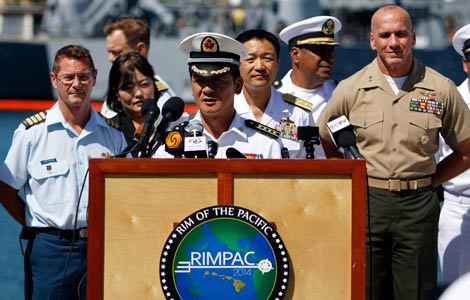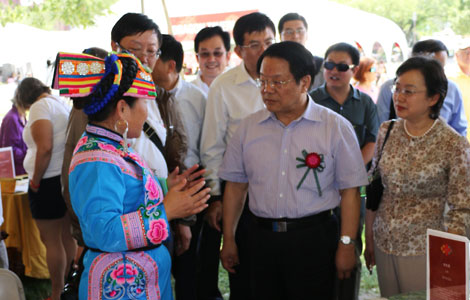Sustainable growth is an article of faith
Updated: 2014-07-01 08:52
By Li Lianxing (China Daily)
|
||||||||
"It must evolve a unique green industrial pathway. Technology exists to enable Africa to industrialize more efficiently and with a smaller ecological footprint than that of the major middle-income economies today."
Prudent exploitation of hydropower, solar, geothermal and wind power provide an unprecedented opportunity for Africa, he says.
"The cost of harnessing renewable energy is falling, thanks to rapid advances in technology."
So when the continent is ready to embrace investment in industries from outside, including China, African governments must be ethical and accountable to their citizens, and investors have a moral responsibility to invest in Africa in a sustainable way.
Whenever China or any other country or entity is involved in any projects in Africa, environmental protection should not be a unilateral endeavor but a joint effort by both sides, he says.
"Africa needs to enforce stringent environmental laws, making mandatory environmental and social impact assessment for all projects. Special attention must be paid to air, water and soil quality standards."
"Strong civil society on economic and environmental justice must be encouraged and strengthened both in China and Africa to undergird fundamental rights. And broad principles of sustainable business practice must be established both in China and among African countries."
Sheng of the UNEP also calls for rigorously enforced regulations covering industrial relocation into Africa, such as the requirement for environmental or sustainability impact assessments.
"African governments could also encourage foreign direct investment in green economic sectors such as sustainable farming, logging and fisheries, eco-tourism, renewable energy technologies, green buildings, waste management and recycling, and low-carbon transport."
Developed and developing countries face different forms of environmental problems, he says.
"The main challenges for developed countries include significant changes in their lifestyles, which are synonymous with excessive - often wasteful - levels of consumption per capita. The United States, for example, with 6 percent of the world's population, consumes 30 percent of its resources."
For many low-income developing countries, the main challenge is to reduce poverty and raise standards of living rapidly without undermining the integrity of ecosystems on the basis of which long-term prosperity depends, and technology can be used to tackle environmental problems, Sheng says.
"The cost of environmental technologies varies from one technology to another. With renewable energy technologies, for example, costs have fallen in recent years and have become increasingly competitive with conventional energy technologies. The extremely high cost of fossil-fuel subsidies and the harmful effects on human health is often overlooked. Estimates of the International Energy Agency are that fossil-fuel consumption subsidies worldwide amounted to $409 billion in 2010, up from $300 billion in 2009."

 Culture camp delivers authentic China
Culture camp delivers authentic China
 RIMPAC press conference holds in Hawaii
RIMPAC press conference holds in Hawaii
 Mulan returns to New York City
Mulan returns to New York City
 US admiral tours Chinese warship
US admiral tours Chinese warship
 Bank of China opens branch in Queens
Bank of China opens branch in Queens
 Minister: Culture the strongest bond linking China, US
Minister: Culture the strongest bond linking China, US
 Asian Film Festival gets underway with Overheard 3
Asian Film Festival gets underway with Overheard 3
 Chilean wines find a market in China
Chilean wines find a market in China
Most Viewed
Editor's Picks

|

|

|

|

|

|
Today's Top News
Bank of China New York opens Queens branch
Former military leader expelled from CPC
China to increase personnel for peace
China, US pact to curb offshore tax evasion
Transformers 4 breaks records in China
DPRK to put two Americans on trial for hostile acts
China, US agree to curb tax evasion
Suspect pleads not guilty in Benghazi attack
US Weekly

|

|





